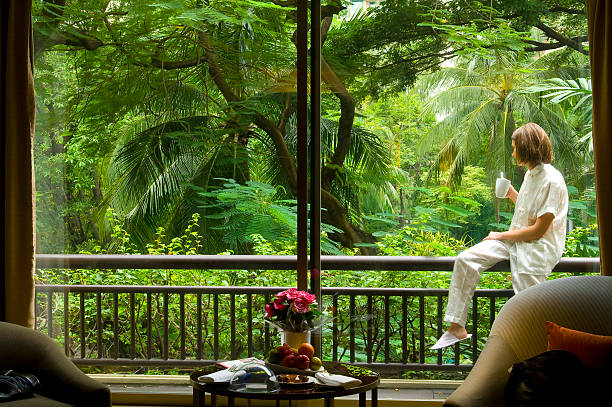Eco-Friendly Garden Suite Design Ideas Popular in Canada

Strong 8k brings an ultra-HD IPTV experience to your living room and your pocket.
As sustainable living becomes a top priority for homeowners across the country, eco-friendly garden suites are emerging as a smart, stylish, and responsible solution for expanding residential space. In Canada, where environmental consciousness is high and housing flexibility is crucial, green garden suite designs are reshaping the landscape—literally and figuratively. Below, we explore in depth the most innovative and sustainable garden suite design ideas making waves across Canadian cities.
What Is an Eco-Friendly Garden Suite?
A garden suite, often referred to as a laneway home or coach house, is a self-contained residential unit located in the backyard of a primary dwelling. What makes it eco-friendly is its incorporation of sustainable materials, energy-efficient systems, and low-impact designs that minimize environmental footprints while maximizing livability.
1. Passive Solar Design: Natural Heat Without the Cost
One of the most impactful ways to reduce energy consumption in a garden suite is through passive solar design. By strategically positioning windows and thermal mass (like concrete or stone floors), suites naturally retain heat during Canada’s cold winters and stay cooler in summer.
South-facing windows allow for optimal sunlight absorption.
Roof overhangs provide shade in summer while allowing light during winter.
Thermal mass materials store daytime heat and release it overnight.
This approach reduces reliance on heating and cooling systems, leading to long-term energy savings and carbon reduction.
2. Green Roofs and Living Walls: Nature at Its Finest
Incorporating green roofs and living walls is a fast-growing trend in eco-friendly garden suite design in Canada, especially in urban areas like Vancouver and Toronto.
Green roofs help insulate the structure, reduce stormwater runoff, and improve air quality.
Living walls (vertical gardens) offer additional insulation and can even grow herbs or vegetables.
These features also contribute to biodiversity, supporting pollinators and native plant species.
These additions are not only functional but also elevate the aesthetic value of the suite, blending architecture with nature.
3. Recycled and Sustainable Building Materials
Using recycled, reclaimed, or locally-sourced materials significantly reduces the environmental impact of construction. In Canada, many builders are turning to:
Reclaimed wood for flooring, siding, and cabinetry.
Recycled metal and composite materials for structural support.
Bamboo, cork, and low-VOC finishes for eco-conscious interiors.
This not only lowers emissions from material production and transport but also gives each suite a unique, character-rich design.
4. Solar Panels and Renewable Energy Integration
With government incentives and increased accessibility, many Canadian homeowners are installing solar panels on their garden suites to reduce reliance on grid energy.
Photovoltaic panels generate electricity year-round, especially efficient in sunny provinces like Alberta and Saskatchewan.
Battery storage systems ensure power availability during outages or peak demand times.
Net metering programs allow excess energy to be sold back to the grid.
Combining solar energy with energy-efficient appliances and LED lighting ensures maximum sustainability.
5. Smart Water Management Systems
In regions experiencing water scarcity or fluctuating utility rates, smart water systems are essential for eco-friendly garden suites.
Rainwater harvesting systems collect and filter roof runoff for irrigation or greywater use.
Low-flow fixtures, including showerheads, faucets, and dual-flush toilets, reduce water consumption.
Greywater recycling systems reuse water from sinks and laundry for toilet flushing or landscaping.
These systems not only conserve water but also lower monthly utility bills and promote self-sufficiency.
6. Modular and Prefab Construction for Low Impact
Modular or prefabricated garden suites are gaining popularity in Canadian eco-design due to their speed, efficiency, and low site disruption.
Factory-built components reduce on-site waste and construction time.
Controlled environments ensure high build quality and energy efficiency.
Modules are often constructed with sustainable certifications like LEED or Passive House standards.
These homes are quick to install, customizable, and often more affordable, making them ideal for urban homeowners with limited backyard space.
7. Smart Home Integration for Sustainable Living
Eco-friendly doesn’t mean tech-free. Many Canadian garden suites now come equipped with smart home technologies that optimize energy usage:
Smart thermostats regulate heating and cooling based on occupancy and weather.
Automated lighting reduces electricity waste.
Remote energy monitoring systems track usage and recommend improvements.
These tools empower homeowners to live more sustainably and adapt to seasonal changes efficiently.
8. High-Performance Insulation and Windows
In Canada’s diverse climate, insulation and airtightness are critical. High-performance garden suites prioritize:
Triple-pane windows with low-emissivity coatings.
Spray foam or cellulose insulation for walls and roofs.
Airtight sealing around all openings to prevent heat loss.
These features ensure comfort in all seasons and significantly reduce energy consumption.
9. Minimalist, Space-Smart Interiors
Eco-friendly doesn’t mean cramped. Today’s garden suites feature clever space planning that maximizes livability without excess.
Built-in storage, multi-functional furniture, and open floor plans reduce material use while enhancing utility.
Natural lighting, neutral palettes, and sustainable textiles create calming, breathable spaces.
Designs often incorporate biophilic elements like indoor plants and natural materials for wellness.
This minimalist approach not only saves resources but also supports mental and physical well-being.
10. Zoning, Permits, and Local Incentives in Canada
Every province and municipality in Canada has its own regulations surrounding garden suite development. Many cities now support eco-friendly builds through:
Density bonuses or reduced development charges for green buildings.
Incentive grants for adding secondary suites.
Streamlined permitting for modular and energy-efficient designs.
Before building, homeowners should consult local authorities and consider working with eco-certified builders familiar with regional codes and best practices.
Conclusion: Building a Greener Future, One Suite at a Time
Eco-friendly garden suites in Canada represent the future of sustainable, flexible, and beautiful residential design. With thoughtful planning, high-quality materials, and modern energy solutions, homeowners can create backyard homes that are not only functional but also aligned with Canada's environmental goals. From urban infill projects to rural retreats, the opportunity to build sustainably and live consciously has never been greater.
Note: IndiBlogHub features both user-submitted and editorial content. We do not verify third-party contributions. Read our Disclaimer and Privacy Policyfor details.


